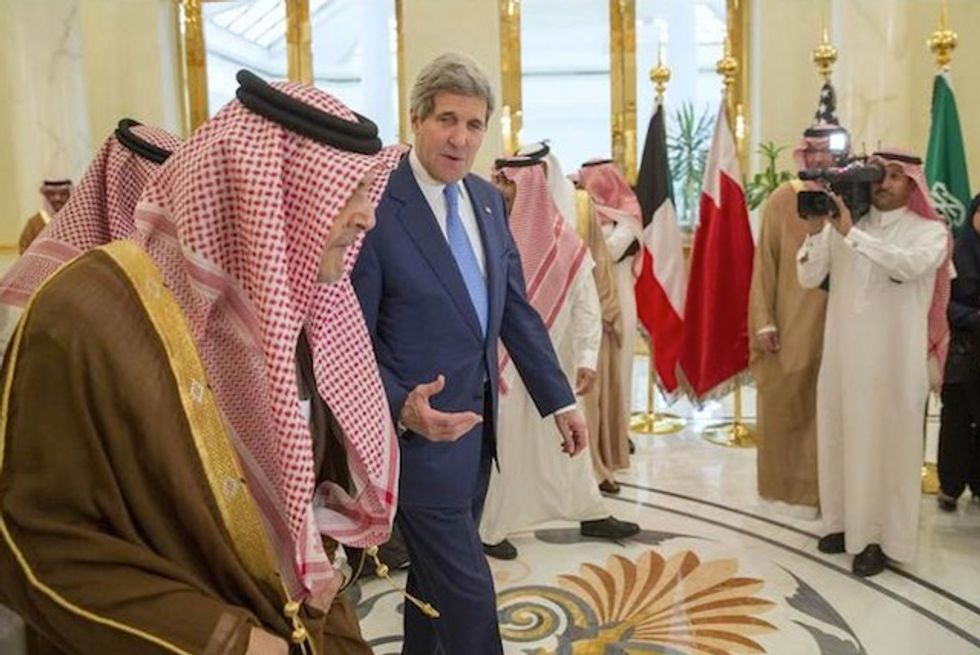One of the side effects of the Obama administration-led efforts to forge a negotiated deal over Iran’s nuclear program is that it has aligned traditional foes Israel and Saudi Arabia in both vociferously opposing what they consider a bad deal that will threaten each country's security.
Secretary of State John Kerry was in Saudi Arabia Thursday to try to allay those fears one day after concluding another round of talks with Iranian nuclear negotiators in Switzerland.
The concern is so acute among that Saudis that, in a stunning display earlier this week, a Saudi columnist penned an article offering his full support to Israeli Prime Minister Benjamin Netanyahu's address to Congress this week “despite the Obama administration's anger and fury.”
Columnist Ahmad Al-Faraj Monday wrote in the pro-government Saudi daily Al-Jazirah, “I believe that Netanyahu's conduct will serve our interests, the people of the Gulf, much more than the foolish behavior of one of the worst American presidents.”
 Secretary of State John Kerry walks with Saud bin Faisal bin Abdulaziz Al Saud, Foreign Minister of Saudi Arabia, during a meeting of Gulf foreign ministers at Riyadh Air Base, on Thursday, March 5, 2015, in Riyadh, Saudi Arabia. Kerry planned to meet with Arab Gulf state allies Thursday before sitting down with the foreign ministers of France, Britain, and Germany in Paris on Saturday to share the state of the Iran nuclear negotiations. (AP Photo/Evan Vucci, Pool)
Secretary of State John Kerry walks with Saud bin Faisal bin Abdulaziz Al Saud, Foreign Minister of Saudi Arabia, during a meeting of Gulf foreign ministers at Riyadh Air Base, on Thursday, March 5, 2015, in Riyadh, Saudi Arabia. Kerry planned to meet with Arab Gulf state allies Thursday before sitting down with the foreign ministers of France, Britain, and Germany in Paris on Saturday to share the state of the Iran nuclear negotiations. (AP Photo/Evan Vucci, Pool)
In his column, translated by the Middle East Media Research Institute, Al-Faraj accused Obama of being an “ally of political Islam” and aspiring to a deal with Iran for his own “personal glory.” In so doing, Obama is acting “at the expense of the U.S.'s longtime allies in the Gulf,” the columnist asserted.
In Riyadh on Thursday, Kerry met with the foreign ministers of the Gulf Cooperation Council: Bahrain, Kuwait, Oman, Qatar, Saudi Arabia and the United Arab Emirates, all of which are nervous about neighboring Iran’s suspected efforts at obtaining a nuclear weapon.
The Associated Press quoted unnamed U.S. officials who said Kerry would reassure them that the emerging deal will not allow Iran to develop a nuclear weapon.
Kerry was expected to say that aside from the nuclear negotiations, the U.S. would oppose “Iranian expansion” and “aggressiveness” in the Middle East. Iran backs Syrian President Bashar Assad, the Hezbollah forces that are fighting to defend his rule, as well as Shiite rebels in Yemen.
In his address to Congress Tuesday, Netanyahu called the emerging nuclear deal “a bad deal.”
After Netanyahu’s speech, Kerry said the aim of negotiations was to “get the right deal, one that can withstand scrutiny.”

 Secretary of State John Kerry walks with Saud bin Faisal bin Abdulaziz Al Saud, Foreign Minister of Saudi Arabia, during a meeting of Gulf foreign ministers at Riyadh Air Base, on Thursday, March 5, 2015, in Riyadh, Saudi Arabia. Kerry planned to meet with Arab Gulf state allies Thursday before sitting down with the foreign ministers of France, Britain, and Germany in Paris on Saturday to share the state of the Iran nuclear negotiations. (AP Photo/Evan Vucci, Pool)
Secretary of State John Kerry walks with Saud bin Faisal bin Abdulaziz Al Saud, Foreign Minister of Saudi Arabia, during a meeting of Gulf foreign ministers at Riyadh Air Base, on Thursday, March 5, 2015, in Riyadh, Saudi Arabia. Kerry planned to meet with Arab Gulf state allies Thursday before sitting down with the foreign ministers of France, Britain, and Germany in Paris on Saturday to share the state of the Iran nuclear negotiations. (AP Photo/Evan Vucci, Pool)


